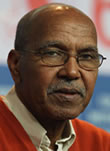Somalia’s Leader: Look Past the Hype by NURUDDIN FARAH

Saturday, October 19, 2013
ANNANDALE-ON-HUDSON, New York — One can’t talk about recent news from Somalia — the deadly attack by Shabab militants on a U.N. compound in June, the decision in August by Doctors Without Borders to pull out of the country, the massacre last month at a shopping mall in Kenya, for which Al Shabab took responsibility — without in some way speaking about Somalia’s president, Hassan Sheik Mohamud.
Just a year into his presidency, Mr. Mohamud has become a darling of the
West — his is the first Somali government officially recognized by the
United States since 1991, even though it controls only a fraction of the
country — and of the oil-rich Arab rulers who want security around the
Horn of Africa.
But when I last visited Somalia, in April, my friends thought that Mr.
Mohamud didn’t have the determination to lead the country, nor the
hardiness to stand up to clan elders who have contributed so much to the
two-decade-plus civil war and still dominate the country. A former
prime minister, Ali Mohamed Gedi, has called him an incompetent novice.
In fairness, nothing Mr. Mohamud does will appease all Somalis, who are
notorious for their petty-mindedness, their tendency to focus on their
grievances, their constant warring.
As a Somali, I share in this frisson of self-blame. I was troubled that
Doctors Without Borders felt compelled to quit Somalia after the murders
of two staff members, Andrias Karel Keiluhu and Phillipe Havet, in
December 2011. “Acceptance of violence against health workers has
permeated Somali society and this acceptance is now shared by many armed
groups and many levels of civilian government,” the group, which tries
to stay above politics, said in explaining its decision to withdraw from
Somalia after 22 years.
What’s appalling is that the killer was identified: Ahmed Salad Farey,
himself a former Doctors Without Borders worker. He was convicted last
year and sentenced to 30 years in prison. But mysteriously, a panel of
appellate judges ordered his release after he’d served about three
months.
A government source whom I trust told me that the government did not
open a public inquiry or even an internal investigation. My source also
told me that Mr. Farey has lived openly in Guriel, his hometown in
central Somalia, since his release, although the president of the
Supreme Court has signed a new warrant for his arrest.
You would expect the president of a dysfunctional state like Somalia to
move with greater alacrity to bolster confidence in the rule of law. Mr.
Mohamud has not done so. It’s not his only deficiency. He has lost
credibility among the countries contributing to the 17,700-member
African Union mission that is propping up his regime. A United Nations
monitoring group has accused associates of his of fleecing the central
bank. To refute these explosive charges — which could lead to the loss
of billions of dollars in foreign aid — Mr. Mohamud hired British and
American consultants. But these consultants were hardly objective:
According to The Financial Times, the British consultants were linked to
a potential oil exploration deal, while the American ones had been
hired by the Somali government to recover overseas assets.
In a country torn by decades of war, the number of political panhandlers
scavenging for scraps on which to feed their ambitions is too great to
count. Online news sites and radio stations serve up a daily fare of
vitriol and abuse, with contributors propagating their clan’s agendas.
Of the no-holds-barred allegations that have been made, I would point
out two. Ahmed Ismail Samatar, a political scientist at Macalester
College who ran for president last year, has blamed his defeat on vote
rigging and vote buying. Even more troubling, Ali Khalif Gallaydh, a
member of Parliament and a former prime minister, has alleged (citing
unnamed British and American intelligence sources) that Mr. Mohamud has
contacts with Al Shabab, the Islamist affiliate of Al Qaeda in East
Africa.
It is impossible to tell whether these allegations are true. But there
is, regardless, an even bigger question: What action, if any, the
president will take in regard to Sheik Hassan Dahir Aweys, now in
government custody after fleeing Al Shabab’s redoubt in Barawa (the
scene of a recent Navy Seal operation to capture a different terrorist).
Sheik Aweys is an elder statesman of religious radicals. He was forced
to flee his base in June after an internal dispute within Al Shabab; he
was flown to Mogadishu and questioned.
But will he ever be brought to trial? Or handed over to the United
States, which has designated him a terrorist; or to Ethiopia or Kenya,
which would like to ask him questions about his terrorism-related
activities, including the recent deadly attack on a mall in Nairobi?
If Mr. Farey, the murderous catalyst for the decision by Doctors Without
Borders to quit Somalia, can regain his freedom after killing two
innocent people, it seems likely that Sheik Aweys, a man supported by
his powerful kinsmen, has nothing to worry about. Those in the West —
like Time magazine, which in April named the president one of the
world’s 100 most influential people, and published a short essay by the
Rwandan president, Paul Kagame, praising him — would be wise to
re-evaluate their rosy assessments until Mr. Mohamud commits himself to
the principles on the basis of which he was elected.
INTERNATIONAL NEW YORK TIMES

Comments
Post a Comment